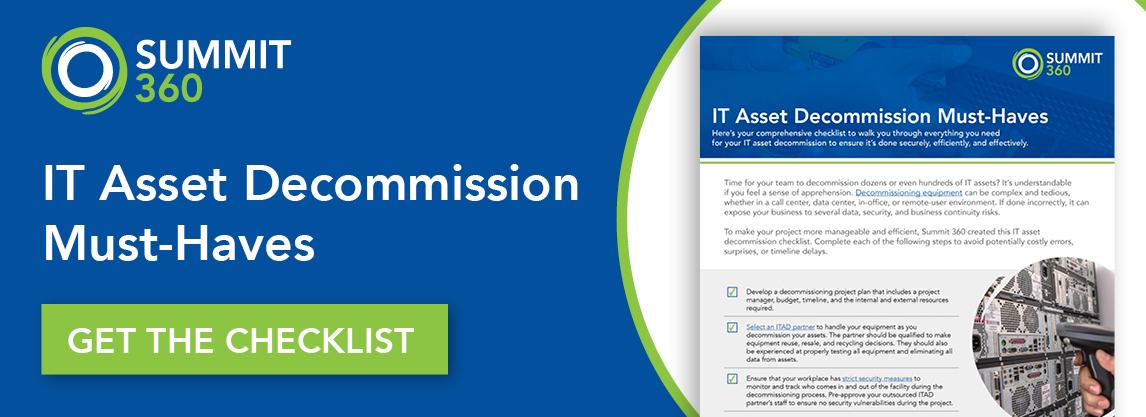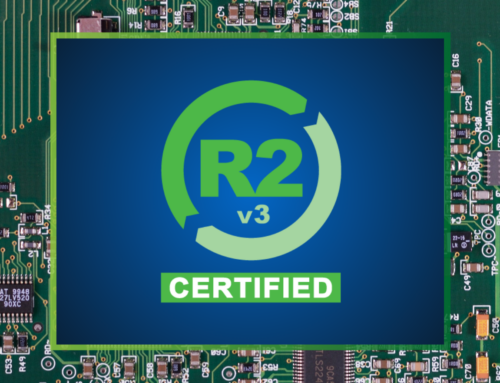ESG and sustainability are becoming more and more essential for companies to address. How companies have responded to broader societal concerns like the environment has changed over the years; It’s been called the 3Ps (for people, planet, and profit), corporate citizenship, and corporate social responsibility. But many companies approached and reported their efforts differently or didn’t have a single overarching strategy.
To bring consistency to how companies address and report their societal contributions, the standard now is to address each of these areas:
- Environmental – how you manage your environmental impact
- Social – how you handle the relationships you have with employees, customers, and the communities where you operate
- Governance – how you lead your company, protect shareholder rights, pay your executives, and more
Learn more about Summit 360’s take on ESG and sustainability in ITAD below.
Why are ESG and Sustainability important now?
Today’s emphasis on environmental, social, and governance (ESG) criteria started because investors wanted to screen the companies they invest in. ESG provides a way for investors to compare companies more directly and encourage companies to act in responsible ways. But companies are facing pressure from other entities as well, including:
- Social pressure – companies are under pressure from social groups – including their own employees – to do more about pressing societal issues like climate change, health and safety, diversity, and more.
- SEC oversight – the Security and Exchange Commission has rules and standards about how companies report their balance sheet so investors can compare apples to apples. Now, the SEC has proposed amendments that promote a “consistent, comparable, and reliable” standard for how companies report their ESG efforts.
- State legislation – The California Senate passed the Climate Corporate Accountability Act earlier this year. This is a U.S. bill that requires large companies to disclose all of their greenhouse gas emissions. In short, companies doing business in California that generate more than $1 billion in gross annual revenue will be required to annually disclose their direct and indirect emissions – including those from their supply chain.
That’s why ESG is important. Now, let’s get into what that means for you.
How do ESG and sustainability relate to ITAD? And what do I need to know?
IT asset disposition (ITAD) vendors are uniquely positioned to support a company’s ESG efforts because they manage the environmental, social, and governance impact of IT assets on a daily basis.
Environmental
From an environmental perspective, ITAD is based on the concept of a circular economy – extending the life of IT equipment and reusing equipment to avoid unnecessary e-waste. In cases where equipment can’t be reused, ITAD vendors harvest components for recycling, moving materials back into the circular economy as manufacturing feedstock to avoid mining new materials.
These waste-avoidance activities have tangible benefits for companies because ITAD vendors can calculate the environmental impact of:
- Saving equipment from landfills and the e-waste stream
- Keeping toxins out of the environment
- Avoiding mining and manufacturing
- Preventing greenhouse gasses
For example, say you need to decommission a data center with 10,000 IT assets. Summit 360 would ensure you adhere to strict environmental compliance practices that reduce your environmental impact. And because we provide hardware disposal documentation (e.g., Audit Reports and Certificates of Recycling), you can demonstrate the measurable impact of your responsible disposition process and report that impact against your ESG goals.
Social
When you extend the life of your IT assets by working with an ITAD vendor, you impact the social sphere of ESG in several ways. These are two of the most common:
- Donating equipment – when you partner with an ITAD vendor, you can arrange to donate equipment you no longer need. This enables people who otherwise don’t have access to technology (or have dated equipment) to bridge the digital divide. Imagine your used IT assets helping people in your community or even worldwide get an education, receive essential training, or even start a business. To many of us, a five-year-old laptop is ancient. To others, it can be life-changing access to technology. That’s social impact.
- Donating proceeds – you can also partner with an ITAD to take the revenue you earn from used equipment and redirect it to a non-profit. (This route can be preferred to equipment donations because non-profits often need a specific type of equipment). Here again, you’re taking equipment you no longer need and using it to make a social impact.
Governance
ITAD partners support governance by helping corporations responsibly govern their data. For example, when you dispose of IT assets, you want an audit trail that shows how every piece of equipment was processed, which method was used to erase your data, and what happened to the equipment’s components. At Summit 360, we provide audit reporting down to the serial number so you can show compliance with regulations regarding protected sensitive data.
The other side of governance is taking responsibility for what happens in your supply chain. You want to prove that you’re disposing of your IT assets ethically and that you’re not working with vendors that use child labor or forced labor downstream.
Summit 360 is R2v3 certified, which means we’ve demonstrated our governance practices and vetted our downstream partners as well. We know they’re doing the right thing during every step of the process. By working with vendors with our certification level, you know you can support your ESG claims.
Need help demonstrating your ESG and sustainability impact?
If you want to take your IT-related ESG efforts to the next level and are ready to demonstrate your consideration for broader environmental, social, and governance goals, the right ITAD vendor can help.
Summit 360 provides our customers with IT asset disposition reporting that’s solid, comprehensive, and verifiable. We can help you demonstrate your ESG-related actions, like reducing greenhouse gasses, supporting social causes, and working with ethical vendors that protect your data.
Want to learn more? Contact us today.





